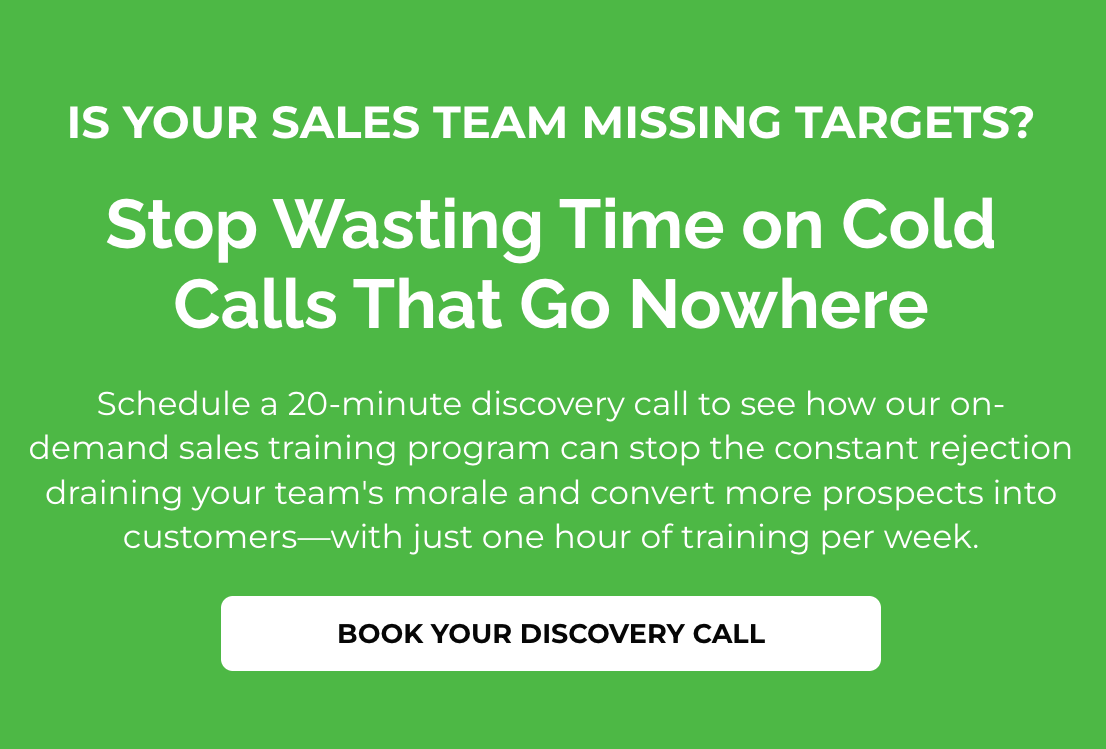To Script or Not To Script. That is the Sales Question

Cold Calling Sales Scripts
“Should you script out your conversation before calling? Would you recommend this, and if yes, then how closely do you think people should stick to the script?”
Traditional sales scripts are usually loaded with faulty sales tactics such as the “yes pattern,” which not only turns prospects off, it turns the salesperson’s brain off. That’s a recipe for disaster.
Before all the anti-sales script advocates start running around the office yelling, “I TOLD YOU SO,” understand this: merely picking up the phone and being a “CAPTAIN WING-IT” isn’t a better solution either.
- Should you read a sales script from start to finish? No.
- Should you know exactly what to say before making a call should the gatekeeper answer the phone? Yes.
- Should you know exactly what to say (before picking up the phone) if you get the prospect’s voicemail? Yes.
- Should you know precisely which sales questions and in which order you will ask (before picking up the phone) when you get the prospect on the phone? Yes.
Being a master of the sales process means you know what to say to get conversations started. You know what sales questions to ask, how to ask them, and why to ask them. This is how you eliminate call reluctance.
The correct sales process will pique the prospect’s interest right from the beginning of even the coldest of cold calls. It will have them willing (even wanting) to be asked questions to determine if both parties should continue to discuss the issue further.
If you aren’t experiencing that now with your sales calls, it means your sales process is the problem.
“Then how closely do you think people should stick to the script?”
It’s not a “sales script” one should stick to but rather a sales process one should follow.
Just like you can’t go from 1st base to 3rd base in baseball, you can’t skip steps within the sales process and expect to hit your numbers consistently.
The right sales process covers all bases and allows you to have an actual conversation with the prospect. A conversation the prospect doesn’t mind having and one that if and when the prospect asks an unexpected question or two, the salesperson will be able to address it and then get back on track covering all the bases.
And when you cover all the bases, you score more runs (sales)
Sales Scripts for Cold Calling
What are the Steps a Sales Script should Cover?
Cold Calling Scripts for Opening Value Statements
The first step your sales script should cover is your “opening value statement.” Your OVS (Opening Value Statement) is that 5 to 10 seconds after you say, “Hello, this is (Your Name)
How many “first-time” calls do you make per day?
I already know the answer is not as many as you probably should be, so let’s say, for argument’s sake, it is 10.
If you have ten brand new leads to contact each day, will you come up with 50 different openers per week, week after week? If you are doing it that way now and not making quota, don’t blame the leads, economy, pricing, or competitors.
Cold Calling Scripts for Gatekeepers and Voicemail
The same goes for Gatekeepers and Voicemails. Are you going to develop something new and better each time you make a call and get a gatekeeper or the prospect’s voicemail?
Cold Calling Scripts for Engagement Questions
What about when you DO get the prospect on the phone, and they agree to take your call? Are you going to be a “captain Wing-it” here, too, and still expect to maximize your earning potential? Knowing what engagement questions to ask is the difference between having a sales conversation and a data dump. You want to have a conversation with prospects. Scripting out the first three engagement questions to identify problems puts you way ahead of the pack because it’s the secret to starting sales conversations.
Cold Calling Scripts for Qualifying Questions
So let me guess, you already know you’re speaking to the “decision-maker” and do not need to waste time asking the right sales questions to CONFIRM they are who you think they are, am I right? After all… you’ve been in sales for years and have always done it this way. You’re a “feel the call and go with the flow” kind of rep, am I right?
Yea… but then you go for a close, and the prospect says, “Yea, I have to check with (boss/manager/partner/accounting/the IT guy),” etc., and now you’re not sure if he is telling the truth or lying.
It sure would have been nice to have a script that reminds one to ask the two vital qualifying questions that need to be asked to correctly identify the prospect’s actual role in the decision-making process BEFORE I stepped in this quicksand of an objection.
Cold Calling Scripts for Time-Frame
Have you ever met with the prospect and did a killer presentation, only to have them tell you at the end that they aren’t looking for anything until (next quarter, six months, or next fiscal year, etc.)?
If you had a playbook to follow that “peppered-in” the “time-frame” sales question before giving a presentation, you would be in a much better position to identify if the prospect’s objection is genuine or a red-herring.
But you don’t like sales scripts, so here we are.
Cold Calling Scripts for Presentations and Objection Handling
Giving persuasive presentations is part art and part science.
You have to know what questions to ask during the presentation to see if you’re on the mark and what to do if you’re not. A sales script would be excellent to make sure those questions get asked.
And what about objection handling? Don’t you think you need a script?
I listen to, and critique sales call recordings every week from EXPERIENCED salespeople worldwide who mistakenly jump to step 4 of the objection handling process and totally miss steps 1 through 3. The end result? They lose more deals than they win and can’t figure out why.
A sales script cheat sheet on how to handle the objection handling process, not just the objection itself, is worth its weight in gold.
Cold Calling Scripts for Follow-up Calls
So you don’t think you need a script for a follow-up call, either? Well, you don’t if you like the answer that you get when you say, “I’m just calling to touch base, check-in and see if you have any questions?” to which most prospects say “Nope,” and the call ends just as fast as it started.
Having a sales script, or as I prefer to call it, a sales playbook, on each step of the selling process is critical to ensure you are not skipping steps.
The number 1 reason you should be in sales is to make as much money as possible by helping others get what they want.
Don’t confuse that with “customer service.”
It’s your job to ask questions that will accelerate and persuade the prospect to take action now and with you.
Learn the sales steps and perfect your script if you want to have fewer resistance calls while making more sales.
It’s time for “Captain Wing-its” to hang up their cape and pick up their script.
“But I don’t like scripts because they make me sound scripted.”
Nope. Every Oscar-winning actor and actress had scripts.
They perfected their craft to where the scripts became alive and convincing.
Stop hiding behind false statements such as “you can’t force your prospect to follow your script.” The people that preach that you cause you to lose money.
When you know what questions to ask, why to ask them, when to ask them, and how to ask them, your prospect will be right there with you in conversation. Ask stupid, ill-timed, and/or unnecessary questions, and your prospect will drop you in a New York Minute.
Take responsibility and put in the work to perfect your craft, and your earning potential will increase. It’s that simple.
– Michael Pedone
Michael Pedone founded SalesBuzz.com: How to Sell By Phone Online Sales Training Course that Reduces Turnover, Increases Pipeline, and Shortens Sales Cycles.

